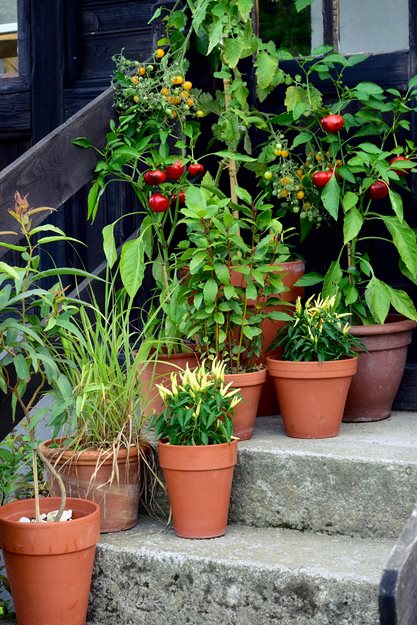For many of us, self-isolation and social distancing heralds a seemingly endless stretch of days of being cloistered inside. Such (necessary) restriction of movement can feel frustrating, but it could be that now is the perfect moment for many households to take a reflective look at their living habits, and consider the ways in which they might lead a more self-sufficient lifestyle. As new climate insights are unveiled by the tumult of the COVID-19 pandemic, it is imperative, now more than ever, that we take the opportunity to change our perspective for the health of the planet. Every one of us can take small steps towards increasing the sustainability of our consumption, and these steps can come from inside the home.
Reusing Food and Other Items in the Home
Food production and waste has an undeniably significant impact on the environment, so perhaps the easiest way to become more self-sufficient is to simply look at the products you use every day and think about how they might be repurposed before they are disposed of. For example, there are a plethora of ways to reuse egg cartons, most obviously for storing your own freshly laid eggs at home or donating them to a neighbour or friend who has chickens. You can also use egg cartons to propagate seeds and cuttings for your windowsill garden. Equally, glass jars and bottles can be reused for storing loose food items such as pasta and rice, for smaller household items like buttons, screws and paper clips, or for homemade scrubs and balms.

The same principle can be applied to food – before you decide to compost or throw away your organic waste, consider whether there is anything else you might use it for. Limes, for example, can be used for citrus vinegar, which can, in turn, be used for household cleaning. Equally, vegetable peelings and scraps can be turned into vegetable stock or given to outdoor pets to eat.
Likewise, coffee grounds are rich in a number of minerals, including magnesium, potassium and calcium, and are therefore useful as a fertiliser for plants, either incorporated into the soil through composting, or sprinkled directly onto the soil surrounding your plant. Or, if you aren’t a gardener, coffee grounds are a good natural exfoliator which, when combined with carrier oils, can be turned into homemade facial scrubs which are amazing, and significantly better – for you and the environment – than any artificial, plastic-packaged product you might buy elsewhere.
Grow Your Own Food
Undeniably the best way to reduce your food waste is to return to the source, by pulling out your green fingers and growing food yourself. If you are lucky enough to have a reasonably large back garden, you can plant a variety of fruits and vegetables, which will come into season at different times of the year. If your outdoor space is more limited, to a small terrace or balcony, there remain many options for growing your own food. Grapes, tomatoes, and some varieties of spinach, for example, all grow on vines and require very little space. Even if you only have a windowsill, there are many herbs and edible flowers which flourish in well-lit indoor spaces. If you get a glut of food, there are various options for preserving your produce – pickles chutneys, jams, and freezing all allow you to keep enjoying your food for months after harvest.

Not only is it immeasurably satisfying to eat food that you have nurtured yourself, you can also be sure of the origins of what you consume, meaning no air miles and no nasty pesticides. Growing your own food also reconnects you to the process of producing the good that you eat and allows us to engage with a more seasonal way of eating. Believe it or not, it is also an amazing way to practice some low-level exercise, as you move, bend, and hold positions – yoga without the named positions!
Keeping Chickens
Though arguably a bigger commitment than planting a vine or recycling your jars, keeping chickens is an excellent way to lead you and your family towards a more self-sustained way of living. Most obviously, keeping chickens gives you a running supply of fresh eggs. But there are other benefits to raising chickens which might not spring to mind. For example, feeding your organic fruit and vegetable waste to your chickens minimises your contribution to landfill waste, and a scrap rich diet ensures that your chickens are getting a variety of nutrients.
In turn, feeding your chickens well will create a cycle of nourishment, as chicken manure is a renewable source of fertiliser for your garden. Using chicken manure as fertiliser saves you from using synthetic fertilisers that can damage the environment. You can even throw old eggshells onto your compost heap to enrich your soil with additional calcium.

Chickens are also voracious eaters of insects which might otherwise damage the plants in your garden and allow you to stay away from harmful chemical pesticides, which, like synthetic fertilisers, can ultimately cause a great deal of harm. You therefore avoid the toxic runoff from garden beds which, when it gets into waterways, and eventually into rivers and oceans, is harmful to the environment.
Moreover, chickens are easy to raise, because they are largely independent animals and, given enough space, can take care of a lot of their own eating and cleaning needs. Their circadian rhythms dictate when they go to bed, so the main consideration for the chicken owner is finding somewhere safe and secure for them to live. Raising chickens is very rewarding and is also a good way to teach your children about leading a more sustainable lifestyle. If you are short on ways to entertain the kids whilst you are self-isolating, giving them the opportunity to interact with alternative ways of producing the food they eat will give them an early sense of their impact on the planet, and the ways in which they can work to positively reduce it.
Declutter
If you have a lot of seemingly purposeless time on your hands at the minute, sustainably decluttering your home is an easy starting point for self-sufficient living, though decluttering should not mean thoughtlessly disposing of everything you deem non-essential. In recent years, the trend for extreme decluttering, resulting in huge numbers of plastic bags full of perfectly usable items, has driven many people to needlessly throw away items which could have been otherwise repurposed. It is worth remembering that an item that you deem to be purposeless might be an invaluable addition to somebody else’s life.

Many of the items you identify as unneeded will still be usable and can be rehomed or given a new home. Charity shops are an excellent first port of call for your unwanted goods, generally taking donations of clothes, shoes, books and accessories, amongst other things. Or, if you’d prefer to try to sell, unwanted items in good condition can be sold online or at local markets and car boot sales. By paring back possessions which you have no use for, you can be more thoughtful about the things which are essential to your day to day life.
Disconnect
The final – and perhaps the most important – step towards self-sufficiency at this difficult time is disconnecting. Though these are deeply uncertain and anxious times, it is worth reflecting on where you are and what you already have. Though many people will be battling with frustration that life as we know has been temporarily placed on pause, it might be that we never again get time like this to connect with our current surroundings and the people around us. The most important step in moving towards a more self-sufficient lifestyle is a change in mindset, which comes from the knowledge that what we have is enough.
Shannon Collins
For The Yucatan Times / Times Media Mexico
—-
Author Bio:
Shannon Collins is a freelance writer, contributing to a variety of publications. As well as working with environmental organisations, she is pursuing a MA in English Linguistics at University College London.


